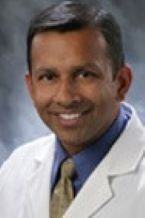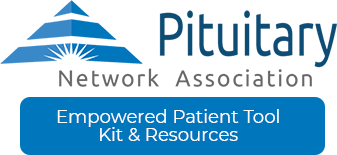 Dr. Sandeep Kunwar is an eminent neurosurgeon who serves on the PNA’s Board of Directors. He is surgical director of the California Center for Pituitary Disorders and a professor of neurosurgery at UCSF. He is also surgical director at the Taylor Bell Neuroscience Institute in the Washington Hospital Healthcare System in Fremont, CA. He opened his private practice there in 2006. He received a Bachelor of Arts degree from UC Berkeley in 1988. From 1991-2 he trained as a Howard Hughes Medical Institute Research Scholar at the National Cancer Institute, working in the laboratory of molecular biology. He went to graduate from UCSF medical school in 1993, did his residency there in neurological surgery in 1998, and joined the faculty upon completion in 1999. From 1997-98 he served as a Research Fellow in the Brain Tumor Research Center at UCSF. He was selected by renowned pituitary surgeon Dr. Charles Wilson to take over his practice upon retirement.
Dr. Sandeep Kunwar is an eminent neurosurgeon who serves on the PNA’s Board of Directors. He is surgical director of the California Center for Pituitary Disorders and a professor of neurosurgery at UCSF. He is also surgical director at the Taylor Bell Neuroscience Institute in the Washington Hospital Healthcare System in Fremont, CA. He opened his private practice there in 2006. He received a Bachelor of Arts degree from UC Berkeley in 1988. From 1991-2 he trained as a Howard Hughes Medical Institute Research Scholar at the National Cancer Institute, working in the laboratory of molecular biology. He went to graduate from UCSF medical school in 1993, did his residency there in neurological surgery in 1998, and joined the faculty upon completion in 1999. From 1997-98 he served as a Research Fellow in the Brain Tumor Research Center at UCSF. He was selected by renowned pituitary surgeon Dr. Charles Wilson to take over his practice upon retirement.
Dr. Kunwar specializes in gamma knife radiosurgery for metastatic and primary brain tumors, and uses the endonasal approach for pituitary tumors. His research works to improve surgical therapy for brain tumors, particularly glioblastomas. He has pioneered a minimally invasive surgical technique for skull-based tumors and has successfully applied that skill to transcranial and spine patients as well.
He was kind enough to answer questions from the PNA. His responses follow.
• What inspired you to choose your career path?
My interest in the brain started after a personal experience. I developed amnesia after a fall when living in Chicago while in elementary school. This lead to my fascination in how memory was processed, how chemical reactions can tell us that 2+2=4. Later in life, inspired by my father who loved working with his hands, I realized that I had an interest in neurosurgery. After attending medical school and residency at the University of California, San Francisco, my research and clinical interest focused on brain tumors. I was fortunate to work closely with Dr. Charlie Wilson who inspired the pursuit of perfection and always doing what is best for the patient. It was under Dr. Wilson’s tutelage that I understood the power of hormonal health on an individual’s quality of life, the elegance of transsphenoidal surgery for pituitary pathology, and the impact a single surgeon can have. He instilled in me the concept that we must strive to do better. When he retired two decades ago, I committed myself to improving the treatment of pituitary tumors, honing not only my surgical skills (we started performing the endonasal transsphenoidal approach in 2001, eliminating the need for nasal packing and shortening the hospital stay to one day for most patients) but my understanding of hormonal health. Although I work with the best neuro-endocrinologists at UCSF, I tried to learn as much as they know to best help my patients.
• What is the primary focus of your work/research?
My main work focus has been the treatment of pituitary tumors, in improving the outcomes and decreasing the complications. For example, we have worked on techniques to maintain or improve pituitary hormonal function. The goal of preserving the thinned out, damaged gland that remains is as important as curing/treating a tumor. This includes using multimodal therapy if needed to optimize a patient ‘s normal hormonal health. In the end, these are benign tumors and the results of treatment should never be worse than the disease. We need to minimize/eliminate the risks of damaging the gland (including diabetes insipidus), meningitis, and CSF leaks; and maximize our chance of curing the tumor. Finally, it is imperative to pass these skill sets to the next generation of surgeons.
• What do you consider to be the future of your field?
In the short term, the risks of surgery will decrease and the options for multimodal therapy will increase. For example, we will see better drugs to control hormonal hypersecretion, more focused and readily available ways to give radiation therapy (radiosurgery), and more uniform outcomes among different centers/surgeons. In the long run, I hope we can regenerate normal pituitary function in those patients that have lost their function because of their tumor or treatment.
• What should patients know about your field/what deserves more recognition/awareness?
The PNA has done an excellent job in educating patients about the importance of experience and multidisciplinary groups in the management of pituitary pathology. The greatest impact in outcome is technique and experience. Unfortunately, the tools used to perform surgery have become a focus for some. This has become a marketing tool which can confuse patients and detract from the main issues which are the surgeon’s experience/outcomes and the goals of treatment.
What deserves continued recognition is early diagnosis. The key to improving outcomes for all patients in the future is early diagnosis. It was this goal that made PNA so appealing to me. With early diagnosis, cure is easier to achieve, preservation of the normal gland function is more readily possible and the overall impact of hormone abnormalities can be limited.
• What would you like to convey about yourself to your patients?
There are many very talented and accomplished neurosurgeons, perhaps fewer spectacular pituitary-specific surgeons. It is important to choose a surgeon with experience and one who understands pituitary pathology, one who can explain his or her goals, outcomes and complications and most importantly, one you feel comfortable with. I’ve had the great honor to operate on over 2,500 pituitary patients. For each, it remains the best part of my job to take time to educate them about their disease, the cause of their symptoms, the anatomy of their tumor and our goals in treating their pathology. Maximizing cure must always be balanced with minimizing risk, and having a great team to help support the process are the key to success. I would thank all the patients who have put their faith in me – it is an honor and a privilege to be part of their care.
• Why did you get involved with the PNA; what is the extent of your involvement?
Education remains the most powerful tool in improving health, and that has been on the forefront of the PNA. I got involved with the PNA because of my respect and admiration for Robert Knutzen back in 2004. I served on the board early on and have contributed to the educational information available. I fully support the PNA’s focus on patient education and in improving earlier diagnosis.



